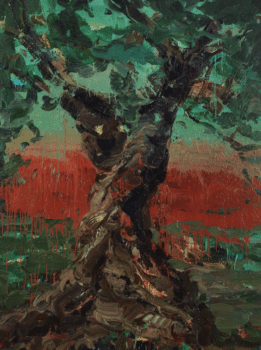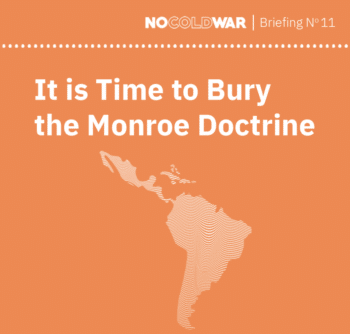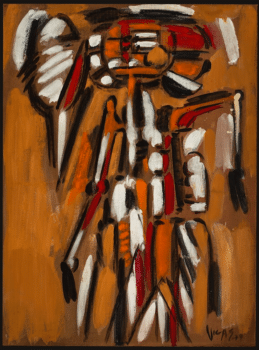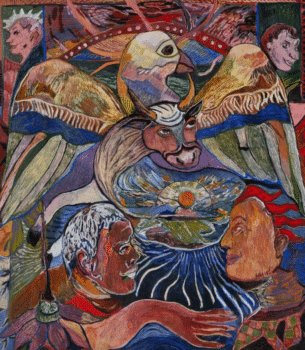Dear friends,

Tagreed Darghouth (Lebanon), from the series The Tree Within, a Palestinian Olive Tree, 2018.
Greetings from the desk of Tricontinental: Institute for Social Research.
Every day since 7 October has felt like an International Day of Solidarity with the Palestinian People, with hundreds of thousands gathering in Istanbul, a million in Jakarta, and then yet another million across Africa and Latin America to demand an end to the brutal attack being carried out by Israel (with the collusion of the United States). It is impossible to keep up with the scale and frequency of the protests, which are in turn pushing political parties and governments to clarify their stances on Israel’s attack on Palestine. These mass demonstrations have generated three kinds of outcomes:
- They have drawn a new generation not only into pro-Palestine activity, but into anti-war—if not anti-imperialist—consciousness.
- They have drawn in a new section of activists, particularly trade unionists, who have been inspired to stop the shipment of goods to and from Israel (including in places such as Europe and India, where the governments have supported Israel’s attacks).
- They have generated a political process to challenge the hypocrisy of the Western-led ‘rules-based international order’ to demand that the International Criminal Court indict Israeli Prime Minister Benjamin Netanyahu and other senior Israeli government officials.
No war in recent years—not even the ‘shock and awe’ campaign used by the United States against Iraq in 2003—has been as ruthless in its use of force. Most horrifying is the reality that civilians, penned in by the Israeli occupation, have no escape from the heavy bombardment. Nearly half (at least 5,800) of the more than 14,000 civilians that have been murdered are children. No amount of Israeli propaganda has been able to convince billions of people around the world that this violence is a righteous rejoinder for the 7 October attack. Visuals from Gaza show the disproportionate and asymmetrical nature of Israel’s violence over the past seventy-five years.

Vincent De Pio (Philippines), Back to the Future, 2012.
A new mood has taken root amongst billions of people in the Global South and been mirrored by millions in the Global North who no longer take the attitudes of U.S. leaders and their Western allies at face value. A new study by the European Council of Foreign Relations shows that ‘much of the rest of the world wants the war in Ukraine to stop as soon as possible, even if it means Kyiv losing territory. And very few people—even in Europe—would take Washington’s side if a war erupted between the U.S. and China over Taiwan’. The council suggests that this is due to the ‘loss of faith in the West to order the world’. More precisely, most of the world is no longer willing to be bullied by the West (as South Africa’s Foreign Minister Naledi Pandor put it). Over the last 200 years, the U.S. government’s Monroe Doctrine has been instrumental in justifying this type of bullying. To better understand the significance of this key policy in upholding U.S. dominance over the world order, the rest of this newsletter features briefing no. 11 from No Cold War, It Is Time to Bury the Monroe Doctrine.
In 1823, James Monroe, then president of the United States, told the U.S. Congress that his government would stand against European interference in the Americas. What Monroe meant was that Washington would, from then on, treat Latin America and the Caribbean as its ‘backyard’, grounded by a policy known as the Monroe Doctrine.
Over the past 200 years, the U.S. has operated in the Americas along this grain, exemplified by the more than 100 military interventions against countries in the region. Since the fall of the Soviet Union in 1991, the U.S. and its Global North allies have attempted to expand this policy into a Global Monroe Doctrine, most destructively in Western Asia.
 The Violence of the Monroe Doctrine
The Violence of the Monroe Doctrine
Two decades before Monroe’s proclamation, the world’s first anti-colonial revolution took place in Haiti. The 1804 Haitian Revolution posed a serious threat to the plantation economies of the Americas, which relied upon enslaved labour from Africa, and so the U.S. led a process to suffocate it and prevent it from spreading. Through U.S. military interventions across Latin America and the Caribbean, the Monroe Doctrine prevented the rise of national self-determination and defended plantation slavery and the power of the oligarchies.
Nonetheless, the spirit and promise of the Haitian Revolution could not be extinguished, and in 1959 it was reignited by the Cuban Revolution, which in turn inspired revolutionary struggles across the world and, most importantly, in the so-called backyard of the United States. Once again, the U.S. initiated a cycle of violence to destroy Cuba’s revolutionary example, prevent it from inspiring others, and overthrow any government in the region that tried to exercise its sovereignty.
Together, U.S. and Latin American oligarchies launched several campaigns, such as Operation Condor, to violently suppress the left through assassinations, incarcerations, torture, and regime change. These efforts culminated in a series of coups against left-wing forces in the Dominican Republic (1965), Chile (1973), Uruguay (1973), Argentina (1976), and El Salvador (1980). The military governments that were subsequently installed quashed the sovereignty agenda and imposed a neoliberal project in its place. Latin America and the Caribbean became fertile ground for economic policies that benefitted U.S.-led transnational monopolies. Washington co-opted large sections of the region’s bourgeoisie, selling them the illusion that national development would come alongside the growth of U.S. power.

Stivenson Magloire (Haiti), Divided Spirit, 1989.
Progressive Waves
Despite this repression, waves of popular movements continued to shape the region’s political culture. During the 1980s and 1990s, these movements toppled the military dictatorships put in place by Operation Condor and then inaugurated a cycle of progressive governments inspired by the Cuban and Nicaraguan revolutions and propelled forward by the electoral victory of Hugo Chávez in Venezuela in 1998. The U.S. response to this progressive upsurge was yet again driven by the Monroe Doctrine as it sought to secure the interests of private property above the needs of the masses. This counterrevolution has employed three main instruments:
- Coups. Since 2000, the U.S. has attempted to conduct ‘traditional’ military coups d’état on at least twenty-seven occasions, with some of these attempts succeeding, such as in Honduras (2009), while many others were defeated, as in Venezuela (2002).
- Hybrid Wars. In addition to the military coup, the U.S. has also developed a series of tactics to overwhelm countries that are attempting to build sovereignty, such as information warfare, lawfare, diplomatic warfare, and electoral interference. This hybrid war strategy includes manufacturing impeachment scandals (for example, against Paraguay’s Fernando Lugo in 2012) and ‘anti-corruption’ measures (such as against Argentina’s Cristina Kirchner in 2021). In Brazil, the U.S. worked with the Brazilian right wing to manipulate an anti-corruption platform to impeach then President Dilma Rousseff in 2016 and imprison former President Luiz Inácio Lula da Silva in 2018, leading to the election of far-right Jair Bolsonaro in 2018.
-

Oswaldo Vigas (Venezuela), Duende Rojo (‘Red Elf’), 1979.
Economic Sanctions. The use of illegal, unilateral coercive measures—including economic sanctions and blockades—are a key instrument of the Monroe Doctrine. The U.S. has employed such instruments for decades (since 1960 in the case of Cuba) and expanded their use in the twenty-first century against countries such as Venezuela. The Latin American Strategic Geopolitics Centre (CELAG) showed that U.S. sanctions against Venezuela led to the loss of more than three million jobs from 2013 to 2017 while the Centre for Economic and Policy Research found that sanctions have reduced the public’s caloric intake and increased disease and mortality, killing 40,000 people in a single year while endangering the lives of 300,000 others.
End the Monroe Doctrine
U.S. attempts to undermine progressive politics in Latin America, underpinned by the Monroe Doctrine, have not been entirely successful. The return of left-wing governments to power in Bolivia, Brazil, and Honduras after U.S.-backed right-wing regimes illustrates this failure. Another sign is the resilience of the Cuban and Venezuelan revolutions. To date, while efforts to expand the Monroe Doctrine around the world have caused immense destruction, they have failed to install stable client regimes, as we saw with the defeat of U.S. projects in Afghanistan and Iraq. Nonetheless, Washington remains undeterred and has shifted its focus to the Asia-Pacific to confront China.
Two hundred years ago, the forces of Simón Bolívar trounced the Spanish Empire in the 1821 Battle of Carabobo and opened a period of independence for Latin America. Two years later, in 1823, the U.S. government announced its Monroe Doctrine. The dialectic between Carabobo and Monroe continues to shape our world, the memory of Bolívar instilled in the hope of and struggle for a more just society.

Maya Weishof (Brazil), Between Talks and Myths, 2022.
Today, the ugliness of the war on Gaza suffocates our consciousness. Em Berry, a poet from Aotearoa, New Zealand, wrote a beautiful poem on the name Gaza and the atrocities being inflicted upon its people by apartheid Israel:
This morning I learned
The English word gauze
(finely woven medical cloth)
comes from the Arabic word غزة or Ghazza
because Gazans have been skilled weavers for centuriesI wondered then
how many of our wounds
have been dressed
because of themSheena Rose (Barbados), Agony, 2022.
and how many of theirs
have been left open
because of us
Warmly,
Vijay


